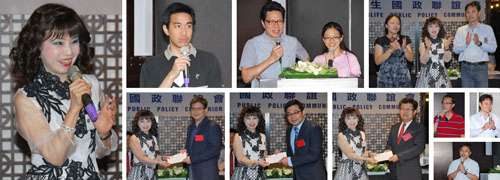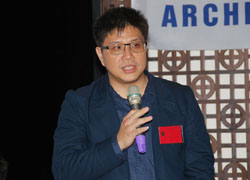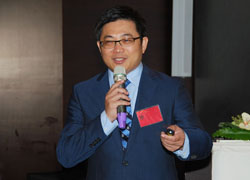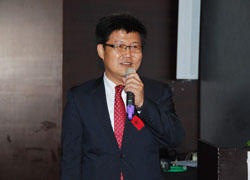Sketch of Public Policy Communion, July 2016Date: 2016-08-05
Section: Activity | 
本會已於2016年7月17日假晶華酒店地下三樓晶英會舉行「祐生國政聯誼會」。在主持人黃晉英秘書長宣布後揭開當日活動序幕,在輕鬆、活潑的節目過後,隨即由主持人帶來重要訊息:「經過祐生全方位的知識培養系統,祐生成員們在各個領域中已逐漸嶄露頭角,更期望藉由國政委員精煉的演講內容,讓在座各位都能清晰掌握國家未來發展方向。另外,隨著時代的改變,傳統法令必須與時蛻變更新,才能讓動盪不安的社會能夠翻轉改變。最後提醒大家,做任何事情皆應考量氣候異變因子,運用智慧判斷,以「求生存、謀生計、延生命」的理念為前提,重新審視自身的作為。」
The July Archilife Public Policy Communion of 2016 was held on July 17, 2016. After a series of relaxing and fun activities, Secretary General Huang Chin-ying made the following announcement, "With Archilife's Omni-knowledge cultivation system, members have gradually emerged from respective fields. I hope that the refined speech of members of the Public Policy Committee can help every one of you clearly capture the future direction of national development. In addition, traditional laws and regulations must be changed to keep pace with times in order to cope with social unrest. Lastly, I would remind you to consider climate change in whatever you do and make wise judgement to review your act in order to seek survival, pursue a living, and extend life."
 緊接著進行專題演講,由國政會委員李彥頤先生主講「亞洲海洋城市的新發展趨勢觀察淺見--香港、高雄、上海、新加坡」。主講人首先分享近期於世界各地參與國際會議的歷程,特別提到於新加坡轉型的過程中所面臨到人口膨脹的問題。接著提及於高雄舉辦之兩岸永續社區規劃工作坊,探討台灣建構自給自足社區的可能性;於上海的兩岸城市養老論壇中,延伸出社會經濟、糧食及建築物的轉用問題,進而影響城鄉發展政策;以經濟貿易為導向的香港,所面臨的問題將是人口的大量湧入。最後,主講人表示陸地資源劃分趨於穩定,海域成為另一個爭奪的開端,海洋城市應找尋發展定位,方能提升競爭力。 緊接著進行專題演講,由國政會委員李彥頤先生主講「亞洲海洋城市的新發展趨勢觀察淺見--香港、高雄、上海、新加坡」。主講人首先分享近期於世界各地參與國際會議的歷程,特別提到於新加坡轉型的過程中所面臨到人口膨脹的問題。接著提及於高雄舉辦之兩岸永續社區規劃工作坊,探討台灣建構自給自足社區的可能性;於上海的兩岸城市養老論壇中,延伸出社會經濟、糧食及建築物的轉用問題,進而影響城鄉發展政策;以經濟貿易為導向的香港,所面臨的問題將是人口的大量湧入。最後,主講人表示陸地資源劃分趨於穩定,海域成為另一個爭奪的開端,海洋城市應找尋發展定位,方能提升競爭力。
Next on the schedule was the keynote speech. First, Mr. Li Yen-yi, a member of the Public Policy Committee, presented a speech on the "A Preliminary View on the New Development Trend of Asia Maritime Cities: Hong Kong, Kaohsiung, Shanghai, and Singapore". First, the speaker shared his recent international conference experience worldwide. In particular, he mentioned the population expansion problem in Singapore's transformation. Then, he talked about the 2015 NTUT+CUHK+SZU+STU held in Kaohsiung where the possibility of "Self-Sustainable Eco-Village" in Taiwan was discussed. At the Cross-Strait Urban Old Age Forum held in Shanghai, the potential impact of social, economic, food, and building trans-use problems on urban and rural development was discussed. To trade-oriented Hong Kong, the inrush of population will be the problem. Lastly, the speaker expressed that although the division of land resources has been stabilized, the striving for maritime resources has just begun. Maritime countries should find the development positioning in order to improve competitiveness.
 接著由國政會委員陳凱凌先生主講「機場捷運籌備與發展願景」。主講人首先提到軌道經營的特性,包含專用路權、人事成本高、規模龐大、經營不易等。接著提到機場捷運橫跨台北市、新北市及桃園,對於房價高漲往外縣市購屋的人口來說,此運輸線更顯重要。機場捷運為輸運航空旅客,特闢直達車,因此列車追越待避更需縝密設計,並規劃於市區預辦登機服務。經營方面著重於優質服務、財務健全及專業。開源策略除了提升運量外,亦進行附屬事業開發,節流策略則是撙節開支。最後,主講人表示期望機場捷運達到系統安全穩定、服務品質優良及永續經營的目標。 接著由國政會委員陳凱凌先生主講「機場捷運籌備與發展願景」。主講人首先提到軌道經營的特性,包含專用路權、人事成本高、規模龐大、經營不易等。接著提到機場捷運橫跨台北市、新北市及桃園,對於房價高漲往外縣市購屋的人口來說,此運輸線更顯重要。機場捷運為輸運航空旅客,特闢直達車,因此列車追越待避更需縝密設計,並規劃於市區預辦登機服務。經營方面著重於優質服務、財務健全及專業。開源策略除了提升運量外,亦進行附屬事業開發,節流策略則是撙節開支。最後,主講人表示期望機場捷運達到系統安全穩定、服務品質優良及永續經營的目標。
Next, Mr. Chen Kai-ling, a member of the Public Policy Committee, spoke on "Airport MRT Planning and Development Vision". First, the speaker talked about the characteristics of railway operations, including the exclusive right of way, high personnel expense, large scale, and operational difficulties. Then, he mentioned that the Airport MRT would be exceptionally important to those who would buy their homes outside of the outer counties when estate prices soar, as the line runs across Taipei City, New Taipei City, and Taiyuan City. To transport passengers from and to the airport, the Airport MRT has planned an express line, and the design of the passing loop and overtaking lane should be exceptionally careful. The pre-check-in service will also be planned in the urban area. In terms of operations, quality service, well-planned finance, and expertise are essential. In addition to raising ridership, the development of secondary business is another way to cultivate income sources. In cutting expense, minimizing expense is a way. Lastly, the speaker hoped that the Airport MRT could achieve the goals of system safety and stability, quality service, and sustainable operations.
 接著由國政會委員林裕益先生主講「大地心情故事」。主講人首先提到七年的莫拉克風災重創南部地區滿目瘡痍的情景,以及部落災民們搬離家園除了硬體住居設備的需求,更所面臨到文化傳承、家族凝聚及就業等問題。接著主講人與大家分享開闢北宜高速公路時所面臨的困難點與施工考量,並提到工程師會就減少破壞與尊重環境的前提下,以專業與謙卑的態度完成建設。主講人接著講述2015年大陸深圳工業區崩塌的嚴重意外,反映了城市施工安全管理的重要性。最後,主講人提及政府各部門的緊急救難皆有標準作業程序,但往往分工權責也造成了很多灰色地帶,導致無法及時救災的遺憾。以今天的故事分享,期望台灣更好! 接著由國政會委員林裕益先生主講「大地心情故事」。主講人首先提到七年的莫拉克風災重創南部地區滿目瘡痍的情景,以及部落災民們搬離家園除了硬體住居設備的需求,更所面臨到文化傳承、家族凝聚及就業等問題。接著主講人與大家分享開闢北宜高速公路時所面臨的困難點與施工考量,並提到工程師會就減少破壞與尊重環境的前提下,以專業與謙卑的態度完成建設。主講人接著講述2015年大陸深圳工業區崩塌的嚴重意外,反映了城市施工安全管理的重要性。最後,主講人提及政府各部門的緊急救難皆有標準作業程序,但往往分工權責也造成了很多灰色地帶,導致無法及時救災的遺憾。以今天的故事分享,期望台灣更好!
Next, Mr. Lin Yu-yi, a member of the Public Policy Committee, spoke on "Touching Stories from Earth". First, he mentioned the devastating scene in southern Taiwan and how indigenous communities were forced to leave their homes after the onslaught of typhoon Morakot seven years ago. In addition to the need of hardware housing equipment, they faced cultural inheritance, family cohesion, and employment problems. Then, the speaker explained the difficulties and construction problems of Freeway NO.5. He also mentioned that engineers would build the freeway with a professional and humble attitude to minimize impacts on the environment and respect nature. According the speaker, the collapse of the Shenzhen Industrial Zone in China in 2015 exposed the importance of construction safety management in urban areas. Lastly, he said that although every country has established SOPs for emergency rescue, regrets for timely rescue often arise as the grey zone in the division of responsibility and authority is huge. He shared these stories to hope for a better future of Taiwan!
演講完畢,黃晉英秘書長代表基金會致贈謝禮予主講人。接著在與會者紛紛利用「餵豬時間」提出個人意見與看法互相交流後,圓滿地結束七月份國政聯誼會。
After the speech, Secretary General Huang Chin-ying presented a gift to the speakers on behalf of the foundation. Then, attendees expressed and exchanged their opinions and views during the piggy hour. The July Archilife Public Policy Communion ended smoothly.
|
|